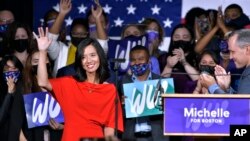Not every mayor-elect of an American city gets post-election congratulations from the Ministry of Foreign Affairs of Taiwan.
Soon after news broke late Tuesday that Michelle Wu won the race for mayor of Boston, Massachusetts, Taiwan's Ministry of Foreign Affairs tweeted its "heartiest congratulations to @wutrain on winning the #Boston mayoral race. We couldn't be prouder of the 1st woman & Asian American to hold the city's top job. More power to her as she keeps breaking those glass ceilings!"
In an historic race where the four top candidates were women of color, Wu, the daughter of Taiwanese immigrants to the United States, became the city's first woman and person of color to be elected mayor of Boston.
Seen a progressive Democrat and protégé of U.S. senator and 2020 presidential candidate Elizabeth Warren, Wu won 62.2% of the vote in Boston. Her rival, centrist Democrat Annissa Essaibi George, won 35.8% of the vote.
"In 2021, we are still seeing barriers come down that can be a little surprising," Wu told reporters Wednesday morning. She said when she ran for City Council in 2013, only one other woman served on the 13-member panel.
"And now, just four election cycles later, to be coming into office with a City Council that is reflective and representative of our communities, to keep building on the progress of this current administration, and to do the work for partnership with communities is incredibly meaningful," she said.
An early start
Warren, one of Wu's professors at Harvard Law School, congratulated Wu soon after her win.
"From teaching her in law school, to working together on my first Senate run, to supporting her campaigns, I've seen her positive energy, her good heart, and her ability to make big change for Boston," Warren tweeted.
Early in her time at Harvard Law, Wu moved her mother, who suffered from schizophrenia, and her younger sisters to Boston from Chicago, Illinois, so she could take care of them while attending school. Wu, whose first language is Mandarin Chinese and who interpreted for her parents, has said that trying to run a tea shop in Chicago while caring for her family persuaded her to go into public service.
Wu graduated from law school in 2012 and worked on Warren's campaign for the U.S. Senate. She ran for Boston City Council in 2013, becoming the first Asian American woman on the council. She was reelected three times and was City Council president from January 2016 to January 2018. In September 2020, she announced she would run for mayor the following year.
'Extraordinarily impressive'
Denise Baer, a political scientist who teaches at George Washington University, told VOA Wednesday that Wu is "extraordinarily impressive" for having started her career early and building a broad base of support.
But, she said, "I think it's going to be really challenging for her to control the levers of power" in Boston, a city that has until now elected only white men as mayor.
Wu takes office November 16. Her plan for the short transition, she said Wednesday, is to ensure "there will be a continuous ability to make sure residents are getting all the city services that are needed." She also called for civility and "a growing sense of what's possible in city government."
Kerri Greenidge, Mellon Assistant Professor in the Department of Studies in Race, Colonialism, and Diaspora at Boston-area Tufts University, said Wu's election in a city known for its institutions of higher learning, as well as being a bastion of Democrat-dominated politics, means she will be taking control of a city "that has often struggled to live up to the highest ideals it has about itself."
"The fact that the city has not had a mayor that is of color or a woman has indicated that that city has not lived up to its reality" as a minority-majority city, one where the population is of a range of ethnicities, Greenidge told VOA in an email.
According to U.S. census data from 2020, Boston's white, non-Latino population makes up 44.5% of the population; those identifying as Black or African American alone, 25.2%; those identifying as Asian alone, 9.7%; and those identifying as Hispanic or Latino, 19.8%. Other races and those identifying as mixed race make up smaller percentages.
Challenges and assets
Among the goals Wu talked about in her campaign are reintroducing rent control to bring down the cost of living in Boston, which has been against state law since 1994; making Boston public transportation free, which her critics say is too costly; and solving the problems of homelessness and addiction as Boston's winter begins to settle in.
Her gender could be either an asset or a liability, according to Baer, who coauthored a study on women and higher office. The study found that women tend to be problem-solvers, "which makes them really excellent officials," Baer said. But she noted that taking control of a well-established power base is challenging.
"It's going to take a lot of strong leadership," she said.
And Greenidge said she believes women of color are judged more harshly for their political actions than white men, particularly on the local level.
"Michelle Wu will have to face that reality," she said. But she believes Boston's breadth of ethnicities will help. The city, she said, "has a strong and well organized Asian American, African American, and immigrant community, and those communities' engagement will be key to mitigating any obstruction or difficulties that Wu will face."




